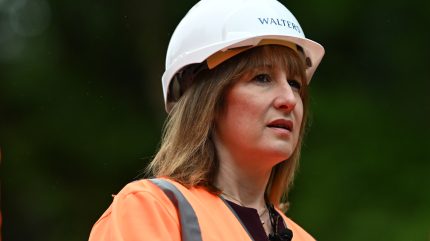
An industrial strategy coordinated across government departments and over different administrations is key to stimulating long-term growth in the UK, an expert has said.
Appearing on an episode of GlobalData’s Instant Insights podcast following the announcement that the UK’s Autumn Budget will be held on November 26, Stephen Barber, Professor of Global Affairs at the University of East London, pointed to the needs for the country to achieve both short-term stability and long-term growth.

Discover B2B Marketing That Performs
Combine business intelligence and editorial excellence to reach engaged professionals across 36 leading media platforms.
While acknowledging the need for public spending cuts following the 2008 financial crisis, Barber outlined that excessive cuts to capital expenditure had damaged the UK’s growth prospects.
“If you look right back four decades or so ago, we sort of took a decision in Britain to become a consumer economy rather than an investment economy,” he said. “I think that was confirmed, really, in our response to the global financial crisis, where there was, for good reasons in many ways, a squeeze in public spending.
“But when we squeezed public spending, actually, one of the parts of spending that we squeezed first, because it was easier politically in many ways, was capital spending. You know, it’s easier to say, ‘Well, we won’t build that road that we were going to build.’ That’s a politically easier decision than to say, ‘Well, we’re going to cut the benefits you’re currently receiving.’
“But of course, capital spending creates growth – and particularly up and down the country where we do need to see a more even spread of prosperity.”

US Tariffs are shifting - will you react or anticipate?
Don’t let policy changes catch you off guard. Stay proactive with real-time data and expert analysis.
By GlobalDataIndustrial strategy
Part of the issue for the UK’s continued underwhelming economic performance since the 2008 financial crisis, Barber contends, is a failure to harness industries that use investment to make best use of the country’s strengths.
“Ever since, really, the 1990s and Michael Heseltine, Peter Mandelson, then in the Blair government, later with Vince Cable in the coalition, even through the May and Johnson years to some extent, and certainly now, there’s always been this sort of industrial strategy,” he said.
“They never kind of take off is the problem. And one of the reasons for that, I think, is that it can’t just be the Department of Industry or the Department of Trade or Innovation doing it. It has to be coordinated across government, and all of those departments have got to be bought into the mission of, ‘Let’s create an investment economy, create a growth economy.’”

Giving defence as an example of one area that we know is likely to grow in importance, Barber argued for the need to invest in the sort of skills that we know will be needed in the future, but doing so in a way that is coordinated across government and administrations. While acknowledging the challenges involved in doing this, he argued that the UK is in a relatively strong position to achieve it.
He explained: “I think that there’s a longer-term challenge here, which is to say, ‘Well, could we become an investment economy? Can we be more bold than simply tinkering around and moving the levers?’ And that’s not going to happen overnight. It’s not going to happen in a year. Probably won’t happen in a parliament.
“But you could see that if you get some consistency in policy, if you have the idea that you have a realistic industrial strategy, which is coordinated by the whole of government, that if you invest in skills, that if you exploit the digital revolution that’s now upon us, there are real opportunities to do it. And in that sense, Britain’s pretty well placed. It’s a free, open, democratic economy. It has a strong skills base, strong education base, strong universities around the country. It could really do something meaningful here.”
UK budget
Barber added, though, that in order to be able to do this, the UK economy must first be stabilised. His concern for the Chancellor, Rachel Reeves, is that her options for doing so are increasingly limited.
“The British economy finds itself really in a very difficult position,” he said. “I think at the time of the first budget, it was clearly in a difficult position, and the Chancellor took decisions in that budget to stabilise public finances, which I think she hoped, and in fact articulated that, would be a one off – you know, the increase in national insurance at the heart of it, and that that sort of £40bn or so additional tax take.
“I think she had hoped that that would be the government taking the unpopular decisions early on so that, come the second budget, they could be much more focused on the strategy of delivering the sort of things that they want to deliver, in particular, working on the broader economy rather than simply stabilising public finances.
“But a year on, in fact, more than now, more than a year on, we find ourselves in another difficult position where there is another black hole in the budget of a similar sort of magnitude to the one that was faced previously by the government. That is for reasons of government. We’re living in a very volatile world. We’ve had Trump two and the tariff regime.
“But the challenge remains, and in one sense that challenge to deal with the immediate problems of balancing the budget contrasts a little bit with the broader strategic challenge that the government faces, which is to restore the British economy to a seriously growing economy that creates prosperity.”





